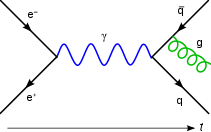| Quantum field theory |
|---|
 |
| History |
In theoretical particle physics, maximally helicity violating amplitudes (MHV) are amplitudes with massless external gauge bosons, where gauge bosons have a particular helicity and the other two have the opposite helicity. These amplitudes are called MHV amplitudes, because at tree level, they violate helicity conservation to the maximum extent possible. The tree amplitudes in which all gauge bosons have the same helicity or all but one have the same helicity vanish.
MHV amplitudes may be calculated very efficiently by means of the Parke–Taylor formula.
Although developed for pure gluon scattering, extensions exist for massive particles, scalars (the Higgs) and for fermions (quarks and their interactions in QCD).

